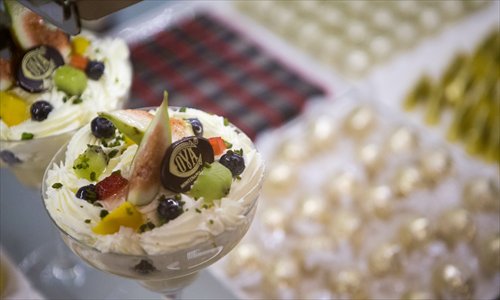
Luxury-branded restaurants should expand their sales model and add more diverse elements to their brand, experts say. (Photos: Li Hao/GT)
Hu Xiaoyu, 30, is a big fan of the French luxury brand, Louis Vuitton. She is fascinated with everything related to it. So, when she learned that an Italian dessert restaurant named COVA Beijing near her workplace is owned by Louis Vuitton, she was thrilled.
Hu, a civil servant in Beijing, went to the restaurant two weeks ago.
"I went there with my friend for afternoon tea. I ordered a tiramisu and a cup of cappuccino. The tiramisu impressed me," said Hu. "It melted in my mouth immediately."
What impressed Hu the most was the quiet and comfortable dining environment. "The walls of the store are made of glass and display their dessert products, such as chocolate and fancy tableware. All of them looked fancy and exquisite," she said. "Eating there made me feel that the distance between me and Louis Vuitton is not a luxury bag, but an afternoon tea."
Hu is not the only one purchasing luxury food in China; a lot of Chinese foodies are following suit. Many other luxury brands, such as Gucci, Prada and Hermes, have broken into the Chinese food industry in recent years, and the trend is growing, news portal jiemian.com reported on September 30.
Beijing is one of the top choices for luxury brands that want to venture into the food business. The Crystal Jade La Mian Xiao Long Bao restaurant, which also belongs to Louis Vuitton, has opened two restaurants in Beijing. Its latest one was opened early this year. German luxury brand Montblanc has a chocolate coffee shop in Sanlitun, Beijing and British luxury brand Alfred Dunhill opened its restaurant Alfie's Beijing in 2013.
"Luxury has become a common cross-border phenomenon," said Huang Shuxiong, a partner at Deloitte China, an industry insight, audit, consulting, and financial advisory firm, in a July 26, 2015 China Business News report.
"It can take advantage of brand influence, and mine their brand value," Huang was quoted as saying in the report. "By cleverly publicizing its brand culture and lifestyle concepts, [luxury-branded] restaurants and other enterprises can firmly lock in high-end consumer groups."
Some Chinese foodies have been lured by luxury brands and do not mind forking over a lot of money for a sumptuous meal in a luxurious environment. However, others are concerned that they will focus too much on brand and not on the food, which will cause them to gradually lose their consumers.
Lured by luxury
Many foodies have lunch or dinner at luxury restaurants due to their brand effect. Some of them are big fans of a certain luxury brand and want to experience everything related to their favorite brands. Others believe in the quality of the goods produced by these luxury brands and see products and services associated with them as a way of improving their lifestyle.
Zhao Wei, 26, a marketing manager in media, enjoyed his first dining experience at Alfie's Beijing on December 2015 when he went for a business dinner.
"I had a great time actually," Zhao said. The cost of the dinner was around 600-700 yuan ($92-107) per person.
Before he attended the event, he was curious about the restaurant.
"A restaurant opened by a fashion luxury brand, I was wondering what it would look like," he said.
"The atmosphere was elegant. Before I started eating, I already had a favorable impression of the restaurant. I guess it came from my good impression of Alfred Dunhill."
For him, compared with other Western-style restaurants in Beijing, Alfie's Beijing has a unique quality and brings him closer to the global luxury brand.
Zhang Jieke, 33, a food artist in Beijing, went to the Crystal Jade La Mian Xiao Long Bao restaurant in Sanlitun two months ago. He ordered three specialties for dinner: small steamed buns, pan fried pork buns and Dandan noodle (Sichuan noodles in peppery sauce).
"I chose to go there because of its reputation and the interior decoration," he said. "The small steamed buns were exquisite, bright and neat under the light. So were the pan fried pork buns, and the black sesame spread on the buns looked very cute. All of them looked like a work of art," said Zhang.
He loved the composition of the meal so much that he took several pictures before eating.


















































